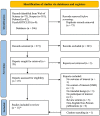Attitudes of medical students toward psychiatry in Eastern Mediterranean Region: A systematic review
- PMID: 36776616
- PMCID: PMC9909281
- DOI: 10.3389/fpsyt.2022.1027377
Attitudes of medical students toward psychiatry in Eastern Mediterranean Region: A systematic review
Abstract
Background: Psychiatry is facing one of the highest levels of shortages among medical specialties. Stigma toward psychiatry plays an influential role in medical students' decision to choose psychiatry as a career and has been reported to be prevalent in different parts of the world, particularly in low/middle-income countries.
Objective: To systematically review the Eastern Mediterranean Region (EMR) medical students' attitudes toward psychiatry, to assess whether their attitudes are stigmatized or not, and the factors affecting their attitudes.
Method: PubMed, Scopus, Web of Science, and PsychInfo (PsycARTICLES) were searched using a combination of main terms "stigma," "psychiatry," "medical students," and the name of Eastern Mediterranean countries. Cross-sectional studies assessing the attitudes of EMR medical students toward psychiatry were included in this review.
Results: Ten studies were eligible to be included in the result synthesis. These were from Pakistan (n = 3), Iran (n = 2), Saudi Arabia (n = 1), Lebanon (n = 1), Egypt (n = 1), Bahrain (n = 1), and Oman (n = 1). Most studies reported a combination of both positive and negative attitudes among medical students; however, the overall attitude was positive. Factors affecting medical students' attitude toward psychiatry included poor psychological well-being, having a friend with a psychiatric illness, involving in a romantic relationship with someone suffering from mental illness, young age, frequency of exposure to psychiatry clerkship/teaching, and quality of psychiatry clerkship. Nevertheless, the final positive or negative outcome of these factors on students' attitudes remained controversial.
Conclusion: Considering the lack of sufficient data from most EMR countries, we need to exercise caution in interpreting the results of this review. Nevertheless, our review indicates that psychiatry is not stigmatized among EMR medical students, and they have generally positive attitudes toward it. The findings of studies evaluating influencing factors are contradictory and demand further exploration.
Keywords: Eastern Mediterranean Region (EMR); attitudes; medical students; psychiatry; stigma.
Copyright © 2023 Mohebbi, Nafissi, Ghotbani, Khojasteh Zonoozi and Mohaddes Ardabili.
Conflict of interest statement
The authors declare that the research was conducted in the absence of any commercial or financial relationships that could be construed as a potential conflict of interest.
Figures


Similar articles
-
Impact of a psychiatry clerkship on stigma, attitudes towards psychiatry, and psychiatry as a career choice.BMC Med Educ. 2015 Mar 7;15:34. doi: 10.1186/s12909-015-0307-4. BMC Med Educ. 2015. PMID: 25888984 Free PMC article.
-
The effect of clinical clerkship on students' attitudes toward psychiatry in Karachi, Pakistan.Acad Psychiatry. 2009 May-Jun;33(3):212-4. doi: 10.1176/appi.ap.33.3.212. Acad Psychiatry. 2009. PMID: 19574517
-
Do medical students' attitudes toward psychiatry and their intention to pursue psychiatry as a career change during psychiatric attachment?Iran J Psychiatry Behav Sci. 2012 Spring;6(1):53-61. Iran J Psychiatry Behav Sci. 2012. PMID: 24644470 Free PMC article.
-
Status of blood transfusion in World Health Organization-Eastern Mediterranean Region (WHO-EMR): Successes and challenges.Transfus Apher Sci. 2017 Jun;56(3):448-453. doi: 10.1016/j.transci.2017.04.003. Epub 2017 May 8. Transfus Apher Sci. 2017. PMID: 28550979 Review.
-
Recruiting medical students into psychiatry in lower income countries.Int Rev Psychiatry. 2013 Aug;25(4):385-98. doi: 10.3109/09540261.2013.813838. Int Rev Psychiatry. 2013. PMID: 24032492 Review.
Cited by
-
The influencing factors of stigma towards people with mental illness among nursing students: a mixed-method systematic review.Med Educ Online. 2024 Dec 31;29(1):2376802. doi: 10.1080/10872981.2024.2376802. Epub 2024 Jul 6. Med Educ Online. 2024. PMID: 38970824 Free PMC article.
-
Mental illness through the perspective of undergraduate medical students in Greece: a cross-sectional study at Aristotle University of Thessaloniki.Front Psychiatry. 2023 Oct 31;14:1228539. doi: 10.3389/fpsyt.2023.1228539. eCollection 2023. Front Psychiatry. 2023. PMID: 38025465 Free PMC article.
-
The attitudes of nonpsychiatric nurses towards mental disorders in China.Front Psychiatry. 2024 Jun 27;15:1420632. doi: 10.3389/fpsyt.2024.1420632. eCollection 2024. Front Psychiatry. 2024. PMID: 38993389 Free PMC article.
-
Addressing the associative stigma of psychiatry and psychiatrists: a survey on the attitudes of medical and nursing students and doctors in Verona, Italy.BMC Psychol. 2025 Apr 9;13(1):357. doi: 10.1186/s40359-025-02682-4. BMC Psychol. 2025. PMID: 40205491 Free PMC article.
-
Mental health-related stigma discrimination and prejudices among Greek healthcare professionals.Front Psychiatry. 2022 Nov 30;13:1027304. doi: 10.3389/fpsyt.2022.1027304. eCollection 2022. Front Psychiatry. 2022. PMID: 36532175 Free PMC article.
References
-
- World Health Organization . Mental Health: Strengthening Our Response. Geneva: World Health Organization; (2018). Available online at: https://www.who.int/news-room/fact-sheets/detail/mental-health-strengthe... (accessed August 24, 2022).
-
- GBD 2019 Mental Disorders Collaborators. Global, regional, and national burden of 12 mental disorders in 204 countries and territories, 1990–2019: a systematic analysis for the Global Burden of Disease Study 2019. Lancet Psychiatry. (2022) 9:137–50. 10.1016/S2215-0366(21)00395-3 - DOI - PMC - PubMed
Publication types
LinkOut - more resources
Full Text Sources

